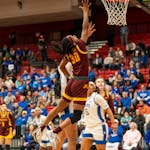Trying to fix the issues in college hoops uncovered by the federal investigation into corruption won't be an easy task, but the first steps in that process were taken this spring.
On Wednesday, the commission on college basketball, headed by former Secretary of State Condoleezza Rice, presented recommendations for reform.
They addressed one-and-done, agents, shoe companies and penalties for rule breakers among other topics, but failed to bring anything new to pending decisions on the transfer process and college players making money off their name and likeness.
From coaches and athletes to college hoops observers and fans there was talk all over social media Wednesday morning about whether or not these recommendations would do anything to solve the corruption problem – and when changes would actually be made. Nobody knows yet.
NCAA President Mark Emmert made a statement that read: "The NCAA appreciates the thorough review and comprehensive work by the commission on college basketball. The Board of Governors and Division I Board of Directors will now review the independent commission's recommendations to determine the appropriate next steps."
Here are some quick key recommendations discussed by the Rice Commission:
Goodbye One-and-Done – The Commission calls on the NBA and the National Basketball Players Association to make 18-year-olds eligible for the NBA draft, which means they could go straight out of high school to the league again. It's not up to the NCAA legally to eliminate one-and-done, so Rice is asking the NBA and NBPA to make those changes sooner than later. From the report: "One-and-done has played a significant role in corrupting and destabilizing college basketball, restricting the freedom of choice of players, and undermining the relationship of college basketball to the mission of higher education. Elite high school players with NBA prospects and no interest in a college degree should not be 'forced' to attend college."
Allowing agent and athlete communication – It's against NCAA rules for college athletes to hire agents but that shouldn't be the case moving forward, Rice's commission states. This impedes their ability to receive valuable information on how to proceed with a professional career. And agents should be allowed to make contact as early as high school and not affect eligibility. The Commission report says: "Elite high school and college players need earlier professional advice, including whether to declare for the draft or whether college basketball offers a superior pathway. If NCAA rules do not allow them to receive that advice openly, they will often seek it illicitly. The NCAA rules should provide that student-athletes may meet and contract with NCAA-certified agents and that they will not lose their eligibility by doing so."
Undrafted players can return to school – This doesn't mess with the Larry Bird Rule, but it's something to help college players who don't sign to be pros. Bird didn't sign with the Celtics after being drafted in 1978 and returned to college. That still wouldn't be allowed. But the Commission recommends, "(high school and college) players who are not drafted should be permitted to change their minds and attend college or return to college, provided they remain academically and otherwise eligible … But the player must return to the same school, and the player must request an evaluation from the NBA's Undergraduate Advisory Committee before entering the draft."
Harsher penalties for cheaters – The FBI probe resulted in several assistant coaches and one legendary coach losing their jobs amid alleged violations, but what happened to other schools, coaches and players implicated? The Commission didn't address how those people included in the federal investigation will be punished if found guilty of cheating, but they recommended stricter penalties for rule breakers moving forward, including five-year postseason bans and increased financial penalties for programs with repeat violators, potential life-time bans for major rules violators already under show-case penalty (coaches basically on probation for certain period of time) and "significantly" increased head coach restrictions for breaking rules.
Limit shoe company influence on summer AAU scene – What does the NCAA think about the Nike Elite Youth Basketball League (EBYL) and its counterparts with Adidas, Under Armour and other shoe sponsored high school AAU circuits and tournaments? They essentially want college coaches not to attend those summer events but instead ones potentially affiliated with the NCAA, USA Basketball, the NBA and WNBA. The Commission recommendation states: "The NCAA and NCAA coaches may no longer associate with non-scholastic basketball events that are not financially transparent and otherwise compliant with NCAA requirements regardless of when they are held …The corruption we observe in college basketball has its roots in youth basketball. The reforms recommended by the Commission will be fruitless unless the NCAA gives serious attention to regulating summer programs."
You can bet the sport will look different in the future. But how much different? We'll see in the next several months before the 2018-19 season.




